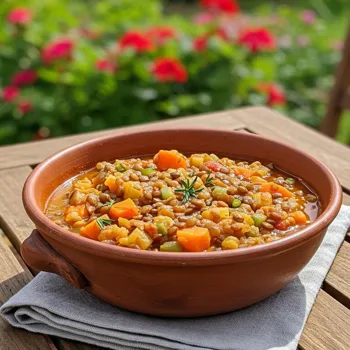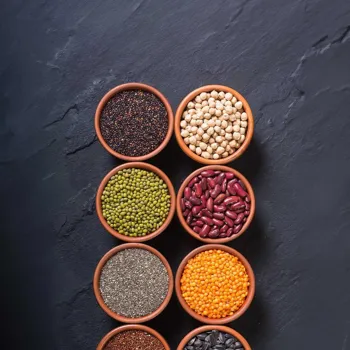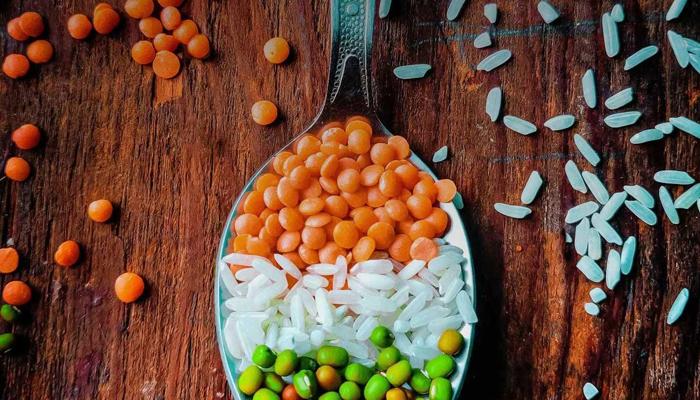Dive into the world of Indian lentils! Discover their nutritional benefits and culinary versatility in this comprehensive guide
In the heart of every Indian kitchen lies a staple, a comfort food, and a nutritional
champion – the humble lentil, or dal. From the creamy richness of maa ki dal to the simple goodness of moong dal, lentils are an integral part of the Indian diet.

But beyond their delicious taste and culinary versatility, Indian lentils are nutritional powerhouses packed with benefits for your health and well-being. This comprehensive guide unveils the secrets of these amazing legumes, helping you understand why they deserve a prominent place on your plate.
Indian lentils: diverse flavors, nutrition; toor dal protein, moong dal digestibility
India boasts a rich diversity of lentils, each with its unique flavor profile and nutritional composition. Some of the most popular varieties include toor dal (split pigeon peas), urad dal (black gram), moong dal (green gram), masoor dal (red lentils), and chana dal (split chickpeas).

Each of these dals brings something special to the table in terms of taste and nutrition. For example, toor dal is a great source of protein, while moong dal is known for its easy digestibility.
Understanding the nuances of each lentil variety can help you tailor your diet to meet your specific needs and preferences. Let's explore the nutritional treasures hidden within these common Indian staples.
Lentils are nutritious protein source, essential for health
Lentils are nutritional powerhouses, offering a wealth of essential nutrients. They are exceptionally high in protein, making them a vital food source for vegetarians and vegans. Protein is crucial for building and repairing tissues, supporting muscle mass, and maintaining overall health.

Lentils are also loaded with fiber, both soluble and insoluble. Soluble fiber helps regulate blood sugar levels and lower cholesterol, while insoluble fiber promotes digestive health and prevents constipation.
These nutrients make lentils incredibly valuable, especially for population which does not have high intake of protein.
Lentils: rich in iron and folate, essential for health
Furthermore, lentils are a good source of iron, an essential mineral for carrying oxygen throughout the body and preventing anemia. Iron deficiency is a common concern, especially among women, and including lentils in your diet can significantly contribute to your iron intake.
They are also rich in folate, also known as Vitamin B9, is vital for cell growth and development, particularly important during pregnancy. It promotes production of red blood cells which improve the oxygen levels. In addition you will find that there are other useful nutrients that the dals have.
Lentils: Heart health, diabetes management, antioxidants
The benefits of incorporating lentils into your diet extend far beyond meeting your basic nutritional needs. Studies have shown that regular consumption of lentils can help lower the risk of heart disease.
The high fiber content helps reduce cholesterol levels, while the potassium content helps regulate blood pressure. Lentils are also beneficial for managing diabetes. The slow-digesting carbohydrates and high fiber content help stabilize blood sugar levels, preventing spikes and crashes.
This makes them an excellent food choice for people with diabetes or those at risk of developing the condition. Also, lentils have antioxidant properties which can prevent cell damage.
Adding lentils to meals: versatile, nutritious, sprouting enhances value
Adding lentils to your meals is easy and versatile. They can be used in soups, stews, salads, and curries. They can also be ground into flour and used to make rotis, dosas, and other Indian breads.

Experimenting with different lentil varieties and recipes can help you discover new and exciting ways to enjoy these nutritional powerhouses. Sprouting lentils enhances their nutritional value and digestibility.
Sprouting increases the bioavailability of certain nutrients, making them easier for your body to absorb. Soak your lentils in water for 8-12 hours, then drain and rinse them daily until you see small sprouts forming.
Lentils aid weight loss due to high fiber, protein, and satiety
Lentils are also a boon to those watching their weight. They are low in calories and fat, yet incredibly filling due to their high fiber and protein content. This can help you feel satiated for longer, reducing cravings and preventing overeating.
Choosing lentils over refined carbohydrates can be a smart strategy for weight management.
Incorporating them into your diet boosts health
Making them a regular part of your diet is a simple yet powerful way to improve your health and well-being.
Indian lentils offer diverse health benefits beyond being a staple
In conclusion, Indian lentils are more than just a culinary staple; they are nutritional powerhouses that offer a wide range of health benefits. From providing essential protein and fiber to supporting heart health and managing blood sugar levels, lentils are an invaluable addition to any diet.
So, embrace the versatility and goodness of Indian lentils, and make them a regular part of your meals for a healthier and happier you. So let us all try to include dals in our food schedule.
AI Generated Content. Glance/InMobi shall have no liability for the content












